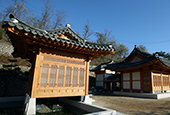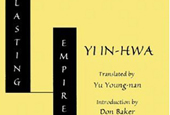'The Guest,' by Hwang Sok-Yong
The Korean War (1950-1953) is a historic event that had a great impact on the Korean Peninsula and the people living on it.
Of the many different faces of war, big or small, that haphazardly happened across the war-stricken peninsula, Hwang Sok-Yong's novel "The Guest" highlights one incident that happened in a small town in Hwanghae-do, in present-day North Korea.
The author adds a writer's imagination to the real life Sinchon Massacre, displacing the real culprit, the U.S. military, with civilians, making the massacre the result of a civil war.
The story unravels as a survivor living in the present is given an opportunity to visit the his hometown in the North, through this visit the novel sheds light on the numerous fallen victims, villagers who were at the same time active sympathizers and co-conspirators during the war.
Having left his hometown long ago, the protagonist, Reverend Ryu Yosup, is currently residing in the U.S. He registers for a round trip to North Korea, available at the time as a part of a "Homeland Visitors" program. His brother, also in the U.S. with him, passes away only a few days before the trip begins. The novel then slowly unveils what his deceased brother had done back home many years before.
The book is written in 12 chapters, adhering to the stages of a traditional Hwanghae-do Jinjinogwigut, a shamanistic ritual. The protagonist's brother, as a ghost, follows his brother home, as the protagonist carries a bone fragment from the ghost's cremated remains.
Upon arriving in Hwanghae-do, however, he realizes that he and his brother's family that was left behind in the North were better off than he had thought.
During the war, his brother was involved in brutal in-village atrocities and neighbor killing neighbor. However, in order to promote national unity, the North's government claimed that these atrocities were committed by U.S. forces.
The protagonist unlocks the well-kept secret in his heart and buries his brother's bone on home soil. The Christian minister then becomes somewhat like a shaman, appeasing the restless spirits with stories to tell.
The word "guest" from the title comes from the fact that the apparent cause of war, democracy versus communism, are ideologies in fact not from this land. Also, the strong hold that Christian forces have in the text are also customs from the West. What's more, in those times small pox was feared as a serious disease from another world. It was referred to as the sonim, the world for "guest" in Korean, or even as mama, meaning, "Your highness," scaring people by its name alone.
About the author Hwang Sok-yong
Born in Manchuria in 1943, his family returned to Korea after independence. He majored in philosophy at Donguk University. He started his career with the novel "Eepseokbugeun"(立石附近) during high school, and became a factory worker, a Vietnam War veteran and even visited North Korea. His experiences are recorded in his numerous works, including "Ohrae doen jeongwon" ("The Old Garden") (2000), "Baridaegi" ("Princess Bari") (2007), "Gaebapbaragibyeol" ("Evening Star") (2008) and many more.
The English version is available at the link below.
http://www.amazon.com/The-Guest-Novel-Hwang-Sok-Yong/dp/1583227512
By Paik Hyun
Korea.net Staff Writer
Sources: Literature Translation Institute of Korea
cathy@korea.kr





